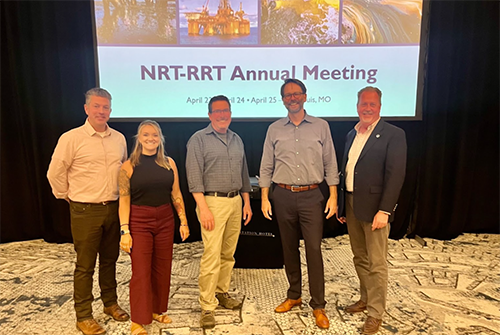NOAA Advances Science, Tools and Coordination for Marine Pollution and Coastal Emergencies at Annual National Response Team Meeting
MAY 6, 2024 — From April 23-25, OR&R staff participated in the annual meeting of the National Response Team (NRT) held in St. Louis, Missouri. The NRT provides technical assistance, resources and coordination on preparedness, planning, response and recovery activities for emergencies involving hazardous substances, pollutants and contaminants, oil, and weapons of mass destruction in natural and technological disasters and other environmental incidents of national significance. The NRT is chaired by the US Environmental Protection Agency, is vice-chaired by the US Coast Guard, and is supported by many federal agencies including NOAA.

On the first day of the meeting, OR&R specialists provided an overview of NOAA tools that can be used to improve federal response to spills and vessels left stranded after major hurricanes. OR&R highlighted the process for identifying potentially polluting targets (e.g., boats, tanks, debris, etc.) from high resolution imagery, as well as categorizing and mapping the targets in a matter of days post-storm for response agencies at the state and federal levels to respond appropriately.
On day two of the meeting, OR&R participants shared information with the broader NRT about response to spills of dielectric fluids, which are critical lubricants for many offshore wind facilities. Discussion covered the physical and chemical properties of these new fluids, the ability to predictively model dielectric fluid spills, and current research and gaps in our knowledge for response and collection during spills. OR&R and NOAA General Counsel staff also provided an overview of potential response scenarios for spills of plastic pellets—the building blocks of almost all plastic in use today—in the U.S. coastal zone.
Nearly 120 federal incident commanders, emergency planners, and response specialists from around the country participated in this year’s meeting. Participants expressed interest in the use of NOAA applications as a common operating picture during pollution response, as well as how to best apply federal authorities to future plastic pellet releases.
Discussions during the meeting highlighted the importance of coordination at the federal level, in order to prepare for a more effective response. Further planned opportunities for coordination include sharing this information and lessons learned with partners at the regional level, establishing working groups and workshops to further the knowledge and development of tools, and maintaining open communication of current and future research opportunities.
